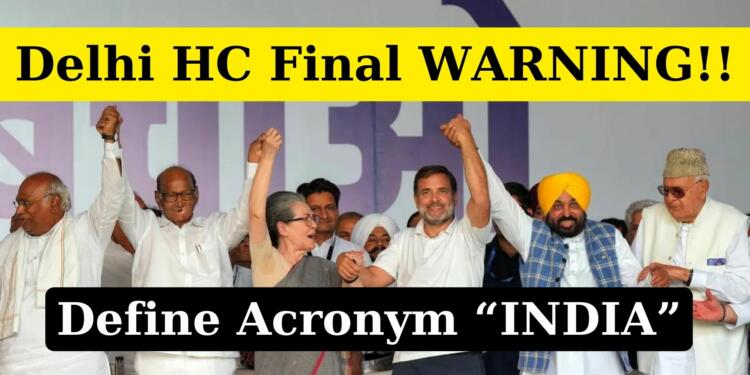The Delhi High Court has granted a final prospect to the government and 26 Opposition parties to file their replies in a petition seeking to prohibit the use of the acronym ‘INDIA’ (Indian National Developmental Inclusive Alliance) by the Opposition bloc.
Significance of the ‘INDIA’ Acronym and its Association with the Opposition Bloc
The acronym ‘INDIA,’ standing for ‘Indian National Developmental Inclusive Alliance,’ holds significant political connotations as it represents a coalition of 26 Opposition parties in India. Formed as a strategic move to challenge the ruling Bharatiya Janata Party (BJP), the alliance aims to unite various political factions under a common umbrella to contest elections and present an alternative vision for governance.
The adoption of the ‘INDIA’ acronym by the Opposition bloc underscores their commitment to national development, inclusivity, and a shared vision for the progress of the country. It serves as a rallying point for disparate political ideologies to converge on common goals and principles, particularly in the lead-up to crucial electoral battles.
Concerns of Girish Bharadwaj and Delays in Legal Proceedings
Businessman Girish Bharadwaj’s concerns regarding the use of the ‘INDIA’ acronym by the Opposition bloc stem from his apprehensions about potential political exploitation and the dilution of national symbols for partisan gain. Bharadwaj perceives the utilization of the acronym as a strategic maneuver by political parties to capitalize on the patriotic sentiment associated with the name of the nation, thereby influencing public perception and electoral outcomes.
Bharadwaj’s efforts to address this issue through legal channels have been met with delays and procedural hurdles, exacerbating his frustrations. Despite multiple opportunities provided to the Centre and Opposition parties to respond to the petition seeking prohibition on the use of the ‘INDIA’ acronym, the process has been protracted, causing undue inconvenience and impeding timely resolution.
Timeline of Events and Response from the Election Commission (ECI)
The timeline of events pertaining to Girish Bharadwaj’s advocacy against the use of the ‘INDIA’ acronym underscores the persistence of his efforts and the systemic challenges encountered in seeking redressal.
In July 2023, Bharadwaj initiated legal action by filing a petition before the Delhi High Court, urging it to prohibit the use of the ‘INDIA’ acronym by the Opposition bloc.
Subsequently, Bharadwaj also lodged a representation with the Election Commission (ECI) on July 19, 2023, drawing attention to the alleged misuse of national symbols for political purposes.
However, Bharadwaj’s pleas for intervention from the ECI were met with disappointment, as the Commission responded by asserting its inability to regulate political alliances, citing the absence of statutory provisions empowering it to do so under the Representation of the People Act or the Constitution.
The sequence of events underscores the complex interplay between legal frameworks, political dynamics, and institutional mandates in addressing concerns related to the use of national symbols in partisan contexts. Despite Bharadwaj’s advocacy and legal pursuit, the resolution of this contentious issue remains contingent upon judicial deliberation and the interpretation of relevant laws.
Also Read: Mamata hates I.N.D.I.A now
Court Proceedings
In recent developments within the court proceedings surrounding Girish Bharadwaj’s petition against the use of the ‘INDIA’ acronym by the Opposition bloc, the bench led by acting Chief Justice Manmohan has made significant rulings.
Granting Final Opportunity for Filing Replies
Acting Chief Justice Manmohan, along with the bench, has granted a final opportunity to both the Centre and the 26 Opposition parties to file their replies within a stipulated timeframe. This decision indicates the court’s commitment to ensuring a comprehensive consideration of all relevant arguments before reaching a verdict. Despite multiple opportunities provided earlier, the court has now set a definitive deadline, signaling a sense of urgency in the adjudication process.
Refusal to Prepone the Hearing
Notably, the court has refused to entertain a request for preponing the hearing. Despite an application by Girish Bharadwaj for an expedited hearing, citing the prolonged duration of the legal proceedings, the bench has upheld the scheduled date for the final hearing, which is April 10. This refusal indicates the court’s adherence to procedural norms and a commitment to maintaining the integrity of the judicial process. By declining to alter the timeline, the court has ensured that all parties involved have adequate time to prepare their arguments and present their case effectively.
Decision to List for Final Hearing on April 10
In line with its refusal to prepone the hearing, the court has decided to list the case for final hearing on April 10, as per the previously fixed date. This decision provides clarity and certainty regarding the next steps in the legal proceedings, enabling all stakeholders to plan and strategize accordingly. By setting a definitive date for the final hearing, the court aims to expedite the resolution of the case and deliver a timely verdict on the matter at hand.
Arguments by Girish Bharadwaj
Girish Bharadwaj has articulated several key arguments regarding the alleged misuse of the ‘INDIA’ acronym by political parties.
Bharadwaj contends that the adoption of the ‘INDIA’ acronym by the Opposition bloc is a calculated move aimed at exploiting national symbols for political gain. By appropriating the name of the nation for their coalition, political parties seek to evoke patriotic sentiments among voters and enhance their electoral prospects.
Bharadwaj argues that the indiscriminate use of national symbols, such as the name ‘INDIA,’ in partisan contexts dilutes their significance and undermines their sanctity. The instrumentalization of national identity for narrow political interests runs counter to the principles of patriotism and national unity.
Bharadwaj’s legal challenge seeks to prohibit the use of the ‘INDIA’ acronym by the Opposition bloc, citing concerns about its potential to mislead voters and manipulate public opinion. He contends that such actions constitute a violation of ethical norms and electoral integrity, warranting judicial intervention.
Also Read: From Unity to Fragmentation: The Demise of the INDIA Alliance
Response by Senior Advocate Abhishek Singhvi
Senior advocate Abhishek Singhvi, representing the INDIA bloc, has countered Bharadwaj’s arguments with the following rebuttals.
Singhvi asserts that Bharadwaj’s plea is not maintainable in a court of law. He argues that the use of acronyms or coalition names by political parties falls within the realm of political speech and expression, which are protected under the constitutional right to freedom of speech and expression.
Singhvi contends that the formation of political alliances and the adoption of acronyms or coalition names are legitimate exercises of political prerogative. He maintains that political parties have the autonomy to strategize and collaborate in pursuit of their electoral objectives, without undue interference from judicial or regulatory authorities.
Legal Perspectives
The petitioner seeks prohibition on the use of the ‘INDIA’ acronym by political parties on grounds of potential deception and manipulation of voters. The legal basis for this prohibition may involve considerations of electoral laws, constitutional principles, and precedents pertaining to the misuse of national symbols for partisan purposes.
The case raises questions about the balance between freedom of political expression and the integrity of electoral processes. Courts may need to assess whether restrictions on the use of national symbols by political parties are justified in light of constitutional safeguards, such as the right to freedom of speech and expression.
Election Commission’s Response
The Election Commission’s response regarding its jurisdiction over political alliances highlights the complexities of regulating political activities within the framework of electoral laws.
The Election Commission asserts that it lacks the statutory authority to regulate political alliances, as they are not recognized as regulated entities under the Representation of the People Act or the Constitution. This underscores the limitations of the Election Commission’s mandate in overseeing the conduct of political parties and alliances.
The Election Commission’s stance raises broader policy implications regarding the oversight of political activities and the need for comprehensive electoral reforms. The absence of explicit regulatory provisions governing the use of national symbols by political parties may necessitate legislative action or judicial interpretation to address emerging challenges in electoral governance.
In conclusion, highlighted the legal battle over the use of the ‘INDIA’ acronym by political parties, with Girish Bharadwaj raising concerns about its misuse for electoral advantage. The court’s decision to grant a final opportunity for replies and refusal to postpone the hearing reflects a commitment to due process. This case carries significant implications for political discourse, the sanctity of national symbols, and the balance between freedom of expression and electoral integrity. The court’s verdict will likely set a precedent for the regulation of political activities and shape the dynamics of future electoral contests.
Also Read: Delhi High Court setback: Slapped Congress with Rs 1,800 Crore Bill
























